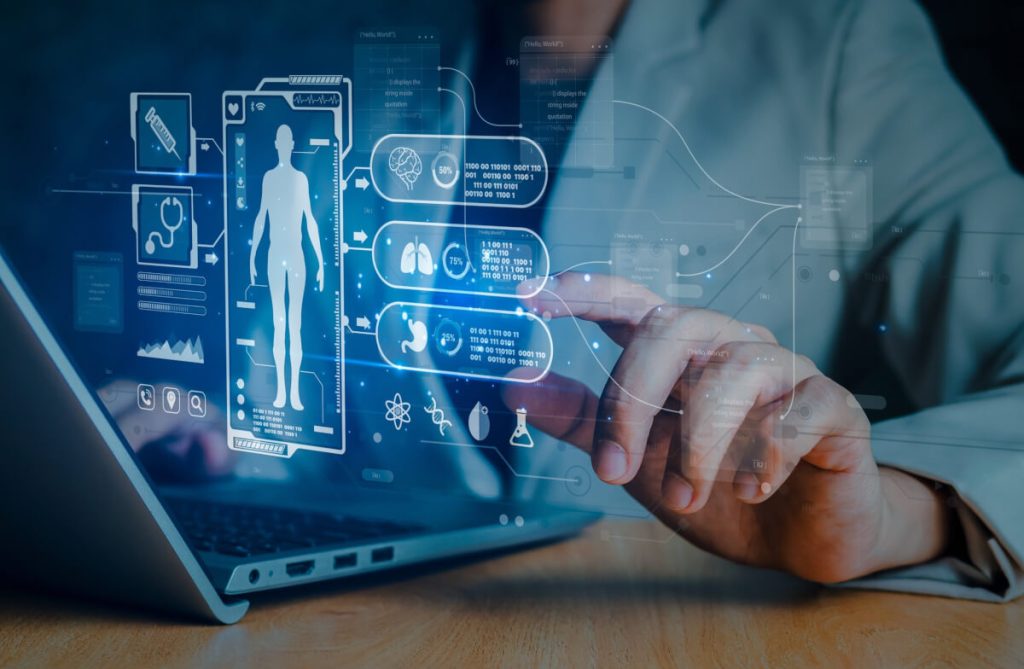

(Photo by Nan_Got on Shutterstock)
From personalized medicine to wearable technology to hair loss innovations, this year could provide no shortage of ways for humans to live healthier
Remember when science fiction promised us flying cars and robot butlers? Well, 2025’s actual breakthroughs might not help you commute through the clouds, but they’re poised to transform something far more important: how we understand and care for our human bodies and minds. From reversing hair loss to regenerating teeth, from predicting mental health patterns to personalized genetic treatments, we’re standing on the edge of discoveries that would have seemed like science fiction just a few years ago.
We asked a panel of nine experts to provide us with their predictions for this year’s biggest research breakthroughs. If there’s one thing we can say, we’re looking forward to a world where the ability to gauge and improve our health might be easier than ever before.
What makes these predictions (or should we really call them expectations?) especially fascinating is how they’re all connected by two powerful threads: the rise of personalized medicine and the integration of artificial intelligence. Gone are the days of one-size-fits-all healthcare – whether we’re talking about stress management, dental care, or treating obesity, researchers are uncovering ways to tailor treatments to each person’s unique genetic makeup, gut microbiome, and lifestyle patterns.
But perhaps the most exciting shift isn’t just in what these breakthroughs might achieve, but in how they’re changing our entire approach to healthcare. Instead of waiting for problems to occur and then treating them, 2025’s innovations are all about prevention and early intervention. Imagine a world where your smartwatch can predict a mental health dip before you feel it, where your genes can be edited to prevent diseases before they start, or where your teeth could actually repair themselves. That world isn’t just science fiction anymore – it’s right around the corner.
Advancements in Aging and Mental Health Research
Dr. Barbara Sparacino, Founder, The Aging Parent Coach
As a geriatric psychiatrist and someone deeply immersed in caregiving and aging issues, I predict 2025 will bring significant advancements in research focused on aging, mental health, and caregiver support. One of the most exciting areas is the use of AI-driven health technologies to detect and manage age-related conditions earlier. For example, wearable devices are becoming smarter at identifying early signs of cognitive decline or physical frailty. I anticipate new breakthroughs in how these tools deliver actionable insights, empowering families and caregivers to intervene before major health events occur.
Another area I’m watching closely is personalized medicine for mental health. Research into biomarkers and genetic testing is advancing quickly, and I believe we’ll soon see targeted treatments for depression, anxiety, and cognitive disorders that are more effective and have fewer side effects. This could be life-changing for older adults who struggle with medication tolerance or for caregivers managing their own stress.
Finally, I predict a surge in studies exploring the psychosocial aspects of caregiving. Researchers are diving deeper into the mental health impacts of caregiving and testing interventions — like mindfulness programs, virtual support groups, and even VR therapy-that help caregivers cope with stress and maintain their well-being. These innovations are essential as caregiving responsibilities grow more common and complex.
What excites me most is the focus on holistic approaches that integrate mental, emotional, and physical health. Whether it’s smarter tech, personalized care, or emotional resilience tools, I believe these breakthroughs will make life better for aging adults and their caregivers too — helping us all age with more grace, dignity, and support.
Mind-Body Connection and Stress Management
Andrew Hogue, Co-CEO, NEUROFIT
2025 will be the year of the mind-body connection — specifically, in understanding how chronic stress physically impacts our bodies. Eighty percent of our nervous system carries information from the body to the brain, not the other way around – yet our approach to mental health targets the mind first.
We’ve already seen at NEUROFIT that our average active user reports a 54% reduction in stress after just one week of mind-body practices — more studies will show how physical interventions can be more effective than traditional cognitive approaches for managing stress and mental health.


Measurement technology can help lead this trend. With wearables becoming more sophisticated, I anticipate studies showing how real-time biometric data can predict stress-related health issues before they become severe. Our own research analyzing millions of stress data points shows that certain physiological patterns consistently precede burnout. Given that chronic stress leads to $1T+ in healthcare expenses each year, I expect to see major studies validating these early warning signals, potentially revolutionizing preventive healthcare.
Another exciting area is the intersection of behavioral science and technology. Studies are currently exploring how brief, targeted interventions can create lasting changes in stress response patterns. We’ve found that 95% of our users experience immediate stress relief within five minutes of specific somatic exercises. I predict we’ll see research showing how short, consistent practices can rewire the nervous system more effectively than longer, sporadic interventions.
Finally, I think we’ll see breakthrough research on social connection’s role in nervous system regulation. Our data shows that prioritizing social play can improve emotional balance by up to 26%. I expect studies in 2025 will further validate how structured social interactions can significantly impact stress resilience and overall mental health outcomes.
These developments could radically change how we approach stress management and mental health care, moving from reactive treatment to proactive regulation and prevention.
Regenerative Medicine in Dentistry
Nagesh Chakka, Dentist, Positive Dental Health
As a dentist, I’m particularly excited about advancements in regenerative medicine and biomaterials for dentistry. Researchers are exploring ways to grow dental tissues or repair teeth using stem cells, which could revolutionize how we treat tooth decay and damage. Imagine being able to regenerate lost enamel or even replace a missing tooth without needing implants. These breakthroughs could lead to less invasive and more natural dental solutions for patients.
In the broader medical field, wearable technology and AI-driven diagnostics are also advancing quickly. Devices that monitor health metrics like glucose levels, heart rate, and oral health indicators in real time could become more accurate and accessible. These tools could improve preventive care by catching potential health issues early, leading to better outcomes for patients. I believe 2025 will bring us closer to more personalized and proactive healthcare.
AI-Driven Personalized Medicine
John Russo, VP of Healthcare Solutions, OSP Labs
By 2025, I foresee significant advancements in AI-driven personalized medicine, wherein the integration of genomics, patient data analytics, and AI will result in much more precise and targeted treatments. There is a growing interest among researchers in developing AI-powered algorithms that could forecast disease progression based on a person’s genetic makeup, lifestyle, and environmental exposure. This would facilitate more proactive and personalized interventions, especially in chronic disease management, oncology, and neurology.


Another field that I predict breakthroughs in is the integration of AI and wearables for real-time health monitoring. Various studies are underway that test wearable technologies that gather continuous physiological data, to be analyzed by AI to spot early signs of impending heart attacks, strokes, or complications arising from diabetes, even before symptoms begin to appear. This will change healthcare from being a reactive practice to proactive care and ensure timely intervention for patients.
Finally, I foresee a rapid increase in research on regenerative medicine, specifically on stem cell therapies and tissue engineering. With technological advancement, there may come the ability to regenerate tissues and organs damaged from specific life traumas, diseases, and conditions that, until today, could not be cured-such as heart disease, spinal cord injury, and neurodegenerative diseases. This space will no doubt interconnect with AI and machine learning to better results and hastened efficacies in treatments.
Genetics and Personalized Preventative Medicine
Siena Burwell, Managing Partner, Surf Search
As a recruiter working in the life sciences industry, I have insider knowledge of the hiring shifts promising to transform medicine in the coming years.
Right now, it’s all about genetics. Personalized preventative medicine is what everyone wants. In other words, why treat a disease if you can avoid it? Tailored care takes into account a patient’s predispositions on a genetic level and neutralizes the threat before it manifests. It’s more possible than ever before, and I’m placing top talent in the sector daily. These candidates range from analysts looking at large data samples to patient-facing counselors focusing on a single profile, but by far, genetic therapy is the most exciting. With CRISPR technology, we’re on the cusp of being able to rework genetic abnormalities to our advantage, instead of simply waiting for them to be expressed. This has the potential to disrupt our understanding of the entire human body.
Progress in Hair Regeneration Research
Dr. Michael May, Medical Director, Wimpole Clinic
In 2025, I anticipate significant progress in hair regeneration research, particularly in stem cell therapy and gene editing technologies. These studies aim to revolutionize treatments for hair loss by targeting the root causes at the cellular level. For example, researchers are exploring ways to reactivate dormant hair follicles or create lab-grown hair that matches the individual’s natural growth patterns.
Additionally, advancements in understanding the scalp’s microbiome could lead to personalized solutions for conditions like dandruff and inflammation, which impact hair health. These breakthroughs can potentially make treatments more effective, less invasive, and tailored to the unique needs of every individual. It’s an exciting time for the field of hair health.
Personalized Nutrition Through Microbiome Research
Akanksha Kulkarni, Clinical Nutritionist, Prowise Healthcare
Work-in-progress research conducted within the microbiome of the gut in 2025 will start having a direct influence on health. Scientists are unpacking how unique gut bacterial profiles influence everything from nutrient absorption to immune functions, thus opening the door to personalized nutrition solutions.
Several ongoing studies aim to develop new microbiome-based tools to offer cures for chronic ailments, like obesity, IBS, and diabetes. These advances promise to allow personalized nutrition based on individual gut composition.
Introducing support changes the approach whereby monitoring gut health will be done using wearable technology and combined with microbiome research. This will allow individuals to take proactive and data-driven approaches to wellness.
Revolutionizing Obesity Treatment with GLP-1
Rachel Lowe, Physician Assistant, Restore Care
The year 2025 can be considered a significant milestone in the treatment of obesity as there will be advancements in the GLP-1 receptor agonist drugs. These drugs, in particular Ozempic, are being investigated for their benefits going beyond weight loss and improving the patient’s metabolic profile and decreasing the likelihood of chronic diseases including diabetes and cardiovascular diseases.
The study is not only confined to the management of obesity and weight loss but it also focuses on the effects of GLP-1 on the brain, control of appetite, and inflammatory cytokines. It is also found that it can help in preventing neurodegenerative diseases and is associated with enhanced cognitive performance.


GLP-1 therapies are expected to enhance these developments when combined with AI-based personalized medicine. Through the use of genetic and metabolic data, clinicians may be able to determine the best course of treatment for each patient thus achieving better outcomes.
AI System for Comprehensive Research
Ricci Masero, EdTech Focused Marketing Manager, Intellek
Stanford has created an AI system research project called STORM that could totally change how we do research in the coming years. This incredible tool isn’t just about collecting information, it’s about understanding topics from multiple angles, almost like having a super-smart research assistant who can dig deep into a subject.
By simulating conversations and asking really intelligent follow-up questions, the system can explore topics in ways we might not think of, pulling together information from trusted sources and creating comprehensive outlines that are more organized and broader in coverage than traditional research methods.
What this means for 2025 is exciting: we’re likely to see AI research tools that can help scientists, writers, teachers, and researchers explore complex topics more efficiently. Instead of spending weeks digging through sources, we might use systems like STORM to quickly generate initial topic research frameworks, identify diverse perspectives, and even spot potential connections between ideas that might have been missed.
The technology could potentially speed up research across fields — from medicine to technology to social sciences — by providing a more systematic and comprehensive approach to early-stage research and writing. While it won’t replace subject matter experts, it could become an incredibly powerful tool that helps us understand and explore complex topics in ways we’ve never done before.








